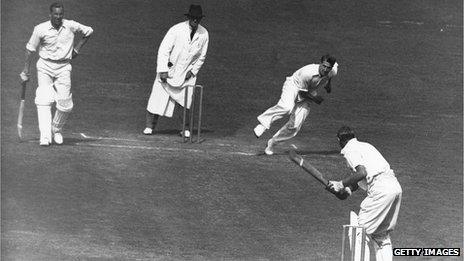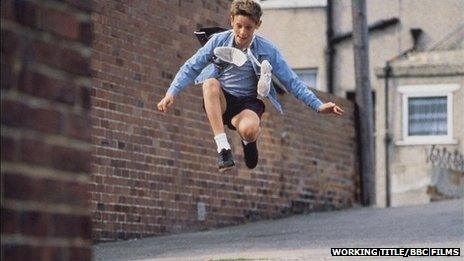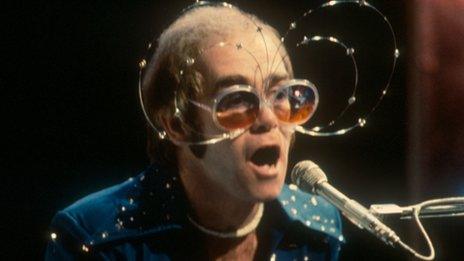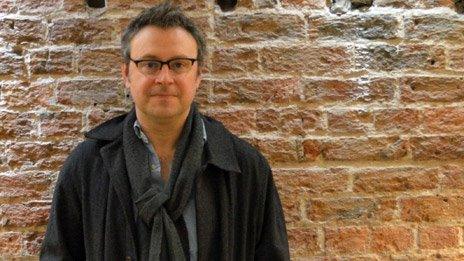Lee Hall: Making films is getting harder
- Published

Lee Hall (left) has written a screenplay for a biopic of Sir Elton John
Billy Elliot writer Lee Hall is giving theatre audiences the chance to hear five new film screenplays he has written about subjects ranging from Sir Elton John to George Orwell and Queen Victoria.
Fifteen years ago, a work-in-progress script titled Dancer by Hall was given an airing at Newcastle's Live Theatre. That script turned into a film called Billy Elliot and earned him an Oscar nomination.
Hall went on to write The Pitmen Painters, which was a hit in the West End and on Broadway, and has adapted Shakespeare In Love for the stage, which opens in London in July.
Now Hall is back at Live Theatre, external, previewing five new screenplays which he hopes will reach the screen. He explains how a writer juggles five scripts at once and why turning screenplays into films is "like playing three dimensional chess".
"Normally one in 10 screenplays ever gets made," he says.
And after recent statistics showed that the number of British films being made has fallen in recent years, Hall says he believes it is getting harder to get films off the ground.
Looking for inspiration

Harold Larwood's aggressive bowling style caused a major controversy
Hall's new screenplays include a biopic of former England fast bowler Harold Larwood, who was at the centre of the controversial Bodyline scandal in Australia in the 1930s, co-written with Slumdog Millionaire's Simon Beaufoy.
He has adapted George Orwell's Down and Out in Paris and London and penned stories about Elton John and Abdul Karim, Queen Victoria's Indian servant.
He has also written a script about French composer Olivier Messiaen, who wrote Quartet for the End of Time while in a German prisoner of war camp during World War Two.
Those are just the ones that are ready. The five scripts are being given readings, in which actors read them for an audience with scripts in hands, at Live Theatre, to see how they work when spoken out loud.
"The screenplays really are labours of love," Hall says. "I spent quite a few years writing for Hollywood studios and really wanted to just do projects that meant a lot to me."
Continually looking for inspiration, he adds: "Most writers are always alert to seeing if something's a story. Nothing is not work."
'I am writing about myself'

Billy Elliot, Hall's first film, was a major hit when it was released in 2000
While his screenplays may appear wildly different, Hall says they have very strong connections.
"For me, the common thing in all of these stories is that they're about the little guy, whether the little guy's Elton John and he turns from the ugly duckling to the swan, or Harold Larwood, who was a miner who became the greatest bowler in the world.
"Even Orwell is about someone who's very unformed - it's about Eric Blair becoming George Orwell.
"A lot of my ideas are about people discovering themselves, using bits of culture or art to do so, and the idea that they not only change themselves but change the world around them by this process of discovery.
"A lot of them are about myself in different ways, which I think is a thing that writers do. Writers tend to write the same story again and again - but the key is to keep it surprising and keep audiences interested as well as yourself."
How to write five scripts at once

The Elton John film, titled Rocketman, will start filming later this year
"I'm writing five or six scripts at any one time," Hall says. "Most writers are used to working on more than one thing. I've just got used to it."
Four of the five scripts being aired on stage have been written in the past 18 months. The Elton John biopic, titled Rocketman, is a decade old but has recently been dusted off.
Because it takes so long to finesse screenplays, the scripts Hall has on the boil will all be at different stages of completion.
"With some of them I'm working on the final details, and with some I'm carving out a big chunk from this unformed slab of stone," he says.
"It's like a sculptor's workshop - you've got things that have been done but are not quite finished yet, and things that you're just about to start, rather than the conveyer belt sequence you might expect.
"The skill of the screenplay is economy - really to boil the thing down until it looks so obvious, inevitably obvious, and then you know it's working."
'I'm surprised any films get made at all'

Hall says mid-budget British films are becoming "tougher and tougher to sell"
"Like most screenwriters, I've written at least 20 scripts that have not been shown," Hall says.
After a script is finished, "so many things have got to come together" for it to reach the big screen, the writer explains.
"It's got to appeal to enough people to warrant spending the money that you need to make it," he says.
"It's got to have the right level of cast. The cast have not only got to be creatively right, they've got to be commercially right - the right people in the right film to appeal to the right people to get the right amount of money.
"That's hard enough in itself, but then you have to get the right director at the right point in their career to be able to be interested enough to tell that story and make it their own.
"And then you have to get the right production company and the right distribution to be in the right part of their creative and commercial journey to be able to see the sense in what you're doing.
"A terribly good screenplay or a terribly obvious story may not meet any of these things.
"Films are so expensive. Very few films are made by just one person giving all the money. They're pieced together and people have very different interests.
"It's at least like three dimensional chess and at any point you can forget about something on another level and it blows the whole film.
"What's surprising to me is that anything gets made at all because it's really, really hard."
...And it's getting harder
The only one of Hall's five scripts to be been given the green light so far is Rocketman, with Sir Elton to be played by Dark Knight Rises star Tom Hardy.
"I think it's a lot harder in Britain to make dramatic films now," Hall says, referring to both cinema releases and single feature-length TV dramas.
With superhero blockbusters dominating the film industry at one end and "small budget films that you can almost fund on your credit card" thriving at the other, there is less room left in the middle, Hall believes.
"The gap between these is getting increasingly barren," he says. "Everybody I talk to in the industry says the same thing, that it's [harder for] the middle ground of film.
"It's traditionally what we've done really well in Britain is becoming tougher and tougher to sell. It's harder to get that stuff made. And unfortunately I'm right in the middle of that."
- Published31 January 2014
- Published11 December 2013
- Published24 October 2013
- Published30 March 2012